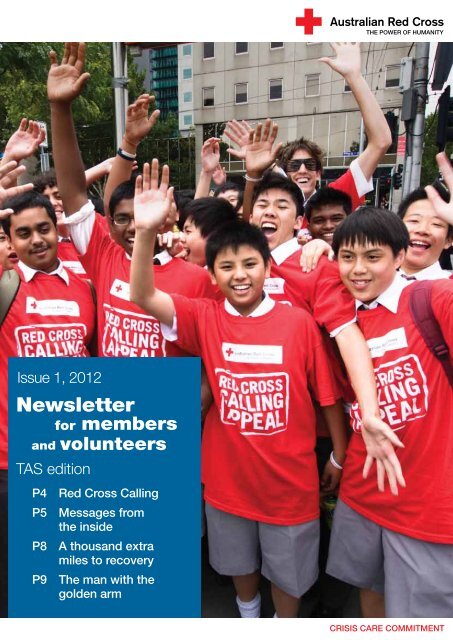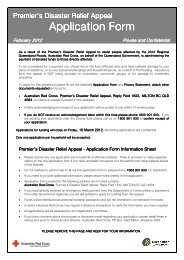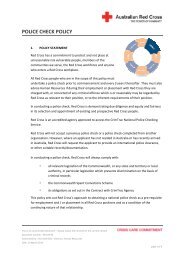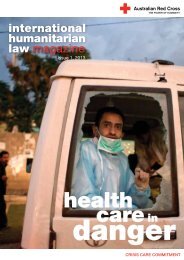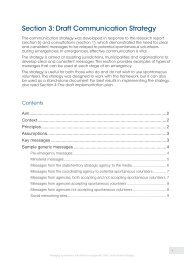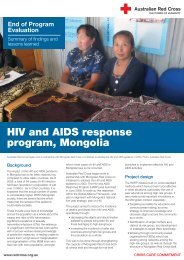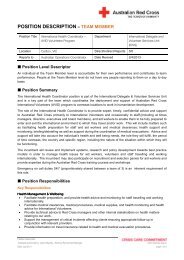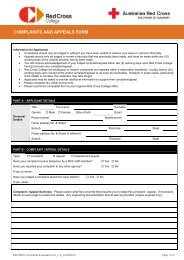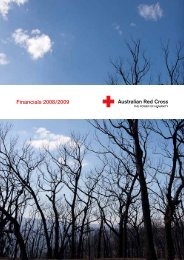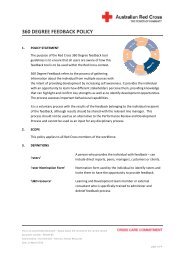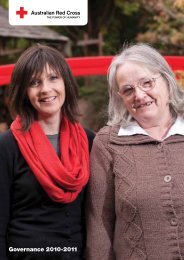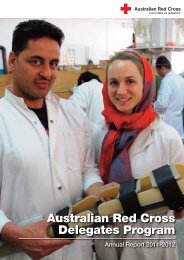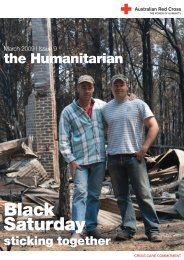TAS - Australian Red Cross
TAS - Australian Red Cross
TAS - Australian Red Cross
Create successful ePaper yourself
Turn your PDF publications into a flip-book with our unique Google optimized e-Paper software.
Issue 1, 2012<br />
Newsletter<br />
for members<br />
and volunteers<br />
<strong>TAS</strong> edition<br />
P4 <strong>Red</strong> <strong>Cross</strong> Calling<br />
P5 Messages from<br />
the inside<br />
P8 A thousand extra<br />
miles to recovery<br />
P9 The man with the<br />
golden arm
PAGE 2<br />
AROUND AUSTRALIA<br />
Message from the<br />
President and CEO<br />
Michael Legge<br />
President<br />
<strong>Australian</strong> <strong>Red</strong> <strong>Cross</strong><br />
Robert Tickner<br />
Chief Executive Officer<br />
<strong>Australian</strong> <strong>Red</strong> <strong>Cross</strong><br />
Welcome to another year full<br />
of new opportunities and ways<br />
you can contribute to the<br />
community, helping the most<br />
vulnerable people in Australia<br />
and overseas.<br />
The success of <strong>Red</strong> <strong>Cross</strong> as the<br />
largest humanitarian organisation in<br />
the world rests on the work of trained<br />
and experienced volunteers in our<br />
emergency and everyday work.<br />
This year, at the National Emergency<br />
Awards recognition events, four <strong>Red</strong><br />
<strong>Cross</strong> volunteers, Tony Cullen, Des<br />
Dowie, Jeffrey Hubbard and Bruce<br />
Smith were recognised for their<br />
contribution to helping <strong>Australian</strong>s<br />
affected by natural disasters with<br />
inaugural National Emergency Medals.<br />
These four volunteers represent the<br />
huge contribution made by our<br />
thousands of <strong>Red</strong> <strong>Cross</strong> members,<br />
volunteers and supporters across<br />
Australia and around the world.<br />
The Awards were presented by the Prime<br />
Minister at a ceremony in Canberra on<br />
Australia Day and at an event in<br />
recognition of the Black Saturday<br />
bushfires in Flowerdale, Victoria.<br />
You can read more about their<br />
remarkable contributions in the<br />
Queensland Floods and Victorian<br />
Bushfires on our website.<br />
This year we will be consulting widely<br />
to develop a new organisation-wide<br />
strategy on Voluntary Service through<br />
<strong>Australian</strong> <strong>Red</strong> <strong>Cross</strong> to guide our<br />
work in this area. We look forward to<br />
updating you and involving you in<br />
this exciting project.<br />
We hope you enjoy this edition of the<br />
newsletter. You can read more about<br />
our work in the recently published<br />
Annual Report 2010-2011, available<br />
on our website redcross.org.au.<br />
L to R; Des Dowie, Tony Cullen, Michael Legge<br />
and Kevin Keeffe at the inaugural National<br />
Emergency Medals presentation on Australia Day.<br />
Jeff Hubbard is presented with his National<br />
Emergency Medal by the Prime Minister.<br />
Photo: <strong>Australian</strong> <strong>Red</strong> <strong>Cross</strong>/Commonwealth<br />
Government.<br />
New President for <strong>Australian</strong> <strong>Red</strong> <strong>Cross</strong><br />
Michael Legge was elected<br />
as President of <strong>Australian</strong><br />
<strong>Red</strong> <strong>Cross</strong> on 8 December<br />
2011 at the Annual General<br />
Meeting in Hobart.<br />
Michael has a long and distinguished<br />
involvement with <strong>Red</strong> <strong>Cross</strong> and<br />
served as Vice President for the eight<br />
years prior to his new appointment.<br />
He joined <strong>Red</strong> <strong>Cross</strong> in 1986 as a<br />
young and enthusiastic volunteer<br />
ambulance driver with the St Marys<br />
branch in Tasmania.<br />
Since then, his involvement with <strong>Red</strong><br />
<strong>Cross</strong> has taken him from rural<br />
Tasmania as far afield as Mongolia,<br />
Pakistan and the Pacific. He has also<br />
represented <strong>Australian</strong> <strong>Red</strong> <strong>Cross</strong><br />
internationally, both as an <strong>Australian</strong><br />
delegate and speaker at international<br />
forums, and as an active participant<br />
in decision-making for the Movement.<br />
Michael and his wife Sophie are the<br />
proud parents of three school-aged<br />
children and they are the<br />
hardworking owners of a sheep<br />
farm in Tasmania. <strong>Australian</strong> <strong>Red</strong><br />
<strong>Cross</strong> congratulates Michael on his<br />
election and look forward to his<br />
leadership initiatives.<br />
In addition, we are delighted to<br />
report that the immediate past<br />
President of <strong>Australian</strong> <strong>Red</strong> <strong>Cross</strong><br />
Greg Vickery AM has been elected<br />
to the Standing Commission of the<br />
International <strong>Red</strong> <strong>Cross</strong> and <strong>Red</strong><br />
Crescent Movement.<br />
This is a tremendous personal<br />
achievement for Greg and also a huge<br />
honour for Australia and our region.<br />
Cover photo: <strong>Australian</strong> <strong>Red</strong> <strong>Cross</strong>/Louise Cooper
<strong>TAS</strong> NEWS<br />
PAGE 3<br />
Message from the Chair<br />
and Executive Director<br />
Welcome to 2012.<br />
We trust you all had a good<br />
break and enjoyed the festive<br />
season with your families and<br />
friends. In the last edition we<br />
noted the excellent<br />
contributions <strong>Red</strong> <strong>Cross</strong> in<br />
Tasmania had made to the<br />
work of <strong>Australian</strong> <strong>Red</strong> <strong>Cross</strong><br />
in 2011, crowned by our<br />
hosting of the most successful<br />
National Conference and<br />
associated events.<br />
The National Conference was held in<br />
Hobart on December 9 and 10 and<br />
attracted over 450 <strong>Red</strong> <strong>Cross</strong><br />
members, volunteers and staff to our<br />
wonderful state. This event was<br />
extremely successful and is being held<br />
in high regard as the most successful<br />
<strong>Red</strong> <strong>Cross</strong> National Conference to<br />
date. The Conference included a<br />
moving and inspiring Oration<br />
presented by Yves Daccord, Director-<br />
General of the ICRC, who travelled<br />
from Geneva to join us. We would like<br />
to thank everyone involved who<br />
contributed to making this event an<br />
outstanding example of the<br />
professionalism, enthusiasm and<br />
passion of <strong>Australian</strong> <strong>Red</strong> <strong>Cross</strong>.<br />
Other highlights of 2011 include the<br />
creation of the Community Detention<br />
team which is supporting vulnerable<br />
people in a very changeable,<br />
demanding and sensitive environment,<br />
the formation of the <strong>Red</strong> <strong>Cross</strong><br />
University Society in Hobart which we<br />
hope to expand to Launceston and<br />
the North-West in 2012, and the<br />
opening of the new and expanded<br />
northern headquarters of <strong>Red</strong> <strong>Cross</strong><br />
in Mowbray.<br />
We are sure 2012 will have its<br />
challenges, but we are equally sure that<br />
working together we will meet every<br />
one of them and continue to grow and<br />
mature as a group and as individuals.<br />
Let’s all look forward to a successful<br />
new year in which we make the best<br />
use of our talents and of our resources<br />
to bring meaning to our shared<br />
mission of improving the lives of<br />
vulnerable people.<br />
As always, please feel free to provide<br />
feedback to tasinfo@redcross.org.au.<br />
Do you have a <strong>Red</strong> <strong>Cross</strong> story?<br />
We would like to hear how you, our valued members and<br />
volunteers, are making a difference.<br />
If you have an idea for a story, or are holding an event that we<br />
can cover, please get in touch.<br />
Please contact your local membership coordinator (contact<br />
details on back).<br />
Best wishes,<br />
Michael Howarth<br />
<strong>TAS</strong> Divisional Chair<br />
Great ideas<br />
can travel<br />
Dr Ian Burke<br />
Executive Director <strong>TAS</strong><br />
The Greg Vickery Scholarship<br />
has been established this year by<br />
the <strong>Australian</strong> <strong>Red</strong> <strong>Cross</strong> Board in<br />
honour of the retiring President, Mr<br />
Greg Vickery AM who continues to<br />
serve <strong>Red</strong> <strong>Cross</strong> as a member, a<br />
volunteer and a leader after nearly<br />
40 years. Greg’s involvement with<br />
<strong>Red</strong> <strong>Cross</strong> continues at the highest<br />
levels following his appointment as<br />
Chair of the Standing Commission<br />
of the International Movement.<br />
The scholarship, valued at $25,000,<br />
will be awarded annually to fund a<br />
joint international learning experience<br />
for a <strong>Red</strong> <strong>Cross</strong> volunteer or member<br />
and a <strong>Red</strong> <strong>Cross</strong> staff member. It will<br />
be a fantastic collaborative<br />
experience and have a direct benefit<br />
for <strong>Australian</strong> <strong>Red</strong> <strong>Cross</strong>.<br />
We encourage members and<br />
volunteers to collaborate with a staff<br />
member and submit the required<br />
joint application by 31 May, 2012.<br />
For further details about how to<br />
apply or the selection criteria, please<br />
contact Cathy Stillwell, at cstillwell@<br />
redcross.org.au or 07 3367 7450.<br />
Newsletter for members and volunteers
PAGE 4<br />
AROUND AUSTRALIA<br />
<strong>Red</strong> <strong>Cross</strong> Calling<br />
Local hero Cliff Baker from Monash, Victoria,<br />
has worked tirelessly to raise funds for <strong>Red</strong><br />
<strong>Cross</strong> Calling. Photo: <strong>Australian</strong> <strong>Red</strong> <strong>Cross</strong><br />
Local heroes may come without<br />
capes and superpowers but the<br />
work that they do is nothing<br />
short of miraculous.<br />
This year as part of our <strong>Red</strong> <strong>Cross</strong><br />
Calling campaign we are looking to<br />
recognise all those local heroes who<br />
are living in communities across<br />
Australia and help <strong>Red</strong> <strong>Cross</strong> support<br />
vulnerable people both locally and<br />
throughout the world.<br />
One local hero is well known to our<br />
<strong>Red</strong> <strong>Cross</strong> Calling team: Cliff Baker<br />
from Monash, Victoria. Cliff has<br />
worked tirelessly with <strong>Red</strong> <strong>Cross</strong><br />
Calling for a number of years, and<br />
raised more than $44,000 last year<br />
– an astonishing effort.<br />
Cliff visits the schools in his area to talk<br />
to students about <strong>Red</strong> <strong>Cross</strong> and<br />
works with student volunteers to<br />
coordinate <strong>Red</strong> <strong>Cross</strong> Calling<br />
fundraisers. He then personally<br />
delivers fundraising kits to the schools<br />
involved, organises street collections<br />
and finally collects and banks all the<br />
money that they raise.<br />
We know that there are many more<br />
local heroes out there who have<br />
contributed in equally important ways<br />
and on a daily basis. This year for <strong>Red</strong><br />
<strong>Cross</strong> Calling we are asking you to<br />
send in your local hero stories.<br />
A local hero could be anyone who has<br />
shown overwhelming support for <strong>Red</strong><br />
<strong>Cross</strong>. This could be:<br />
• A local community member who<br />
has been involved for a long period<br />
of time or has raised significant<br />
funds for <strong>Red</strong> <strong>Cross</strong><br />
• A <strong>Red</strong> <strong>Cross</strong> program manager<br />
who has worked closely with local<br />
communities in their region<br />
• Someone who has volunteered<br />
with <strong>Red</strong> <strong>Cross</strong> either in a time of<br />
crisis or in support of one of our<br />
everyday programs.<br />
Please send your stories of your local<br />
hero, including a short description of<br />
why you think they fit the title to<br />
rcc@redcross.org.au or mail to Local<br />
Hero Story, <strong>Red</strong> <strong>Cross</strong> Calling, Level 9,<br />
17 York St, Sydney NSW 2000.<br />
These stories will help us in our<br />
upcoming promotions of <strong>Red</strong> <strong>Cross</strong><br />
Calling campaigns.<br />
<strong>Red</strong> <strong>Cross</strong> Calling is on during March.<br />
For more information or to fundraise<br />
for us, visit our website at redcross.<br />
org.au, call us on 1800 811 700 or<br />
email us at communityfundraising@<br />
redcross.org.au.<br />
East Africa Drought Appeal<br />
2011 now closed<br />
Thank you for your tremendous efforts in fundraising for the East<br />
Africa Drought Appeal 2011. The final day for fundraising is 29<br />
February and all funds must be banked by 30 March 2012.<br />
Japan tsunami<br />
one year on<br />
This March marks 12 months since<br />
a destructive earthquake and<br />
tsunami severely affected<br />
communities across north east<br />
Japan. The signs of recovery are<br />
clear, with most of the debris now<br />
removed and shops and businesses<br />
gradually reopening in many places.<br />
Generally, people are facing<br />
considerable challenges living in<br />
cramped temporary housing,<br />
especially during the winter season.<br />
Many people are stressed about the<br />
slow pace of reconstruction and feel<br />
uncertain about the future.<br />
The <strong>Australian</strong> <strong>Red</strong> <strong>Cross</strong> Japan<br />
and Pacific Disaster Appeal 2011<br />
raised more than $27 million and<br />
funds raised through the appeal<br />
have been forwarded to Japanese<br />
<strong>Red</strong> <strong>Cross</strong> Society, which<br />
responded within hours of the<br />
earthquake with medical teams<br />
and relief supplies. <strong>Red</strong> <strong>Cross</strong><br />
remains committed to assisting in<br />
the long term recovery of affected<br />
communities in the months and<br />
years ahead.<br />
To find out more about the<br />
ongoing assistance to Japan,<br />
visit redcross.org.au.<br />
Wills for life<br />
If you would like to leave<br />
your footprint by contributing<br />
to the vital work of <strong>Red</strong><br />
<strong>Cross</strong> in Australia and across<br />
the world, why not remember<br />
us in your Will. We can put<br />
you in touch with a solicitor<br />
who can help you write or<br />
change your Will for only<br />
$75. To find out how to leave<br />
a bequest for <strong>Red</strong> <strong>Cross</strong><br />
please contact us by calling<br />
1800 811 700 or email<br />
bequests@redcross.org.au.
AROUND AUSTRALIA<br />
PAGE 5<br />
Messages from the inside<br />
p Respect (above)<br />
Aiming towards respecting our Elders<br />
Teaching future leader.<br />
t Inner Spirit (left)<br />
Our inner spirit gives us that strength<br />
to believe within ourselves. When our<br />
spirit feels strong, your mind is<br />
strong. Our inner spirit also keeps our<br />
families together, our communities<br />
strong and our culture alive.<br />
“I learnt that we need to be<br />
proud of our culture, our<br />
community, to say no to drugs<br />
and alcohol” SAM (save-amate)<br />
Our Way education<br />
participant from Whyalla.<br />
At the Port Augusta Prison in South<br />
Australia, a group of young Aboriginal<br />
men in low security are preparing for<br />
their release by creating beautiful<br />
artwork with strong messages about<br />
their personal experiences. They are<br />
part of the <strong>Red</strong> <strong>Cross</strong> SAM Our Way<br />
program, which focuses on training<br />
and mentoring in rural and remote<br />
Aboriginal and Torres Strait Islander<br />
communities. The program targets<br />
known risks such as depression,<br />
anxiety, violence and problematic<br />
substance abuse in young people.<br />
Based on a successful urban project,<br />
SAM Our Way runs throughout South<br />
Australia, Queensland, Northern<br />
Territory and Western Australia using<br />
preventative, educational and early<br />
intervention approaches with<br />
communities to build sustainable<br />
models of care.<br />
“The yarning was good. I learnt about<br />
keeping healthy, drugs and alcohol,<br />
our culture, keeping strong. Not to be<br />
ashamed about who we are,” says<br />
one SAM Our Way education<br />
participant from Whyalla. “I really<br />
enjoyed the sessions; it was really<br />
good to learn about it. It was cool.”<br />
The focus of the project in the Port<br />
Augusta Prison has been on<br />
developing a shared story that<br />
highlights the journey that the men<br />
have taken before, during and after<br />
their incarceration.<br />
As part of the story, the men have<br />
created artwork that highlight a series<br />
of messages within the shared story.<br />
The messages focus on the historical<br />
and structural factors that have led to<br />
high rates of disadvantage and<br />
disempowerment among Aboriginal<br />
communities, and the role that drug<br />
use plays in Aboriginal incarceration.<br />
“Alcohol can change our ways of<br />
thinking and will also affect our<br />
judgement. There are also choices to<br />
avoid those problems involving<br />
alcohol and other drugs. Which path<br />
will you take?” reads one message.<br />
Another man writes, “Our inner spirit<br />
gives us that strength to believe within<br />
ourselves. When our spirit feels<br />
strong, your mind is strong. Our inner<br />
spirit also keeps our families together,<br />
our communities strong and our<br />
culture alive.”<br />
With these messages in mind, these<br />
young men now prepare to re-join their<br />
communities and their artwork can be<br />
used as a tool for promoting behaviour<br />
change in other young people.<br />
For more information about the SAM<br />
Our Way program or to find out how<br />
you can help visit redcross.org.au or<br />
call 03 9345 1800.<br />
Newsletter for members and volunteers
PAGE 6<br />
INTERNATIONAL NEWS<br />
A troubled paradise<br />
Sivapalam Sundaram not only survived the 2004<br />
tsunami but also a violent 30-year civil conflict<br />
in Sri Lanka. Photo: <strong>Australian</strong> <strong>Red</strong> <strong>Cross</strong> /<br />
Nadeeka Arambewela<br />
Sivapalam’s home town, an<br />
idyllic seaside village in<br />
northern Sri Lanka, has seen<br />
tsunami destruction and 30<br />
years of war. Sivapalam has<br />
lived through all of it. Now he<br />
talks about rebuilding his home<br />
with the help of his surviving<br />
family and <strong>Red</strong> <strong>Cross</strong>.<br />
Sivapalam Sundaram used to fish the<br />
waters every day. Then they turned on<br />
the village. He tells of the deafening,<br />
deep roaring as the wave charged<br />
through the town. The 2004 tsunami<br />
stole his wife and left him clinging<br />
desperately to his fence, fighting the<br />
water. He then sought safety at the<br />
Hindu temple (kovil) with what was left<br />
of his family.<br />
Displacement and fearing for his life are<br />
not new to Sivapalam. He has not only<br />
survived one of the most destructive<br />
natural disasters in recent history but also<br />
a violent 30-year civil conflict in Sri Lanka.<br />
Sivapalam lives in Mamunai village –<br />
an isolated, breathtakingly beautiful<br />
seaside village located in the Northern<br />
Province. However, the white sand and<br />
palms disguise the brutal fighting that<br />
this village has witnessed. In years<br />
following the tsunami, the conflict<br />
intensified and the villagers were<br />
largely housed in Internally Displaced<br />
Persons camps.<br />
Now Sivapalam has returned to his<br />
village after his release from the camp.<br />
His adult son has come back and they<br />
have built two adjacent temporary<br />
shelters with palm fronds and tin sheets<br />
so that they are never too far from each<br />
other. Even with this shelter they are<br />
exposed to the elements and the<br />
monsoon season is near.<br />
Sivapalam is not too worried about the<br />
rains, though. He shows me how his<br />
kitchen garden has been moved to<br />
accommodate the foundations of a new<br />
house that will be built using the funds<br />
contributed by <strong>Australian</strong> <strong>Red</strong> <strong>Cross</strong>. For<br />
the first time in years, he will have<br />
permanent shelter and a lockable door.<br />
The Post Conflict Recovery Program<br />
(PCRP) is a construction program<br />
driven by participants and has proven<br />
to be successful in other conflict and<br />
tsunami-affected areas of Sri Lanka.<br />
Cash grants are given to participants<br />
like Sivapalam to start building. An<br />
accompanying livelihoods and water<br />
and sanitation grant offers extra<br />
support. <strong>Red</strong> <strong>Cross</strong> works closely with<br />
participants, managing and monitoring<br />
the program, and ensuring that people<br />
are technically supported throughout<br />
the construction process.<br />
Sivapalam’s granddaughter waves to<br />
us from behind a tin sheet that forms<br />
the wall of her current house.<br />
Sivapalam nods quietly with a look of<br />
pride as he acknowledges the little girl.<br />
Her blitheness presents a contrast to<br />
the contained emotion of her<br />
grandfather who has survived so much<br />
destruction and pain.<br />
The war and the tsunami have left a<br />
lasting legacy on those who have lived<br />
through them. Although one cannot<br />
erase memories of the past, continued<br />
support will slowly rebuild lives and<br />
renew hope. It is this hope that will<br />
nurture the next generation of villagers,<br />
like Sivapalam’s granddaughter, and<br />
foster positive stories of seaside life in<br />
the north of Sri Lanka.<br />
For more information on our work with<br />
vulnerable communities overseas or to<br />
find out how you can help by<br />
volunteering or making a donation go to<br />
redcross.org.au or call 1800 811 700.<br />
With shelter materials accessed via funds donated by <strong>Australian</strong> <strong>Red</strong> <strong>Cross</strong> to the Post Conflict<br />
Recovery Program, Sivapalam Sundaram is rebuilding his home. Photo: <strong>Australian</strong> <strong>Red</strong> <strong>Cross</strong> /<br />
Nadeeka Arambewela
INTERNATIONAL NEWS<br />
PAGE 7<br />
International scholarships<br />
recognise <strong>Red</strong> <strong>Cross</strong> people<br />
Whether in the field, at their desks, or in<br />
our communities, <strong>Red</strong> <strong>Cross</strong> people<br />
work hard to achieve amazing things.<br />
Vinay Menon and Anita George are being<br />
recognised for their commitment to<br />
humanity through prestigious awards that<br />
will send them abroad to pursue study.<br />
Former national youth leader of<br />
<strong>Australian</strong> <strong>Red</strong> <strong>Cross</strong>, Vinay Menon<br />
has been awarded a prestigious<br />
Rhodes scholarship to study at the<br />
University of Oxford, England. Vinay’s<br />
extensive humanitarian work has also<br />
been recognised in Australia through<br />
the WA Citizen of the Year award<br />
(2008) and the National Young<br />
People’s Human Rights Medal (2009).<br />
This exceptional young man has a<br />
medical degree (MBBS) and a medical<br />
science degree (BMSc in child health)<br />
from the University of Western Australia.<br />
He was the co-founder and volunteer<br />
leader of the <strong>Red</strong> <strong>Cross</strong> ‘World Aware’<br />
program for young refugees.<br />
Anita George – a team leader for the<br />
Community Detention program at <strong>Red</strong><br />
<strong>Cross</strong> in Tasmania – has been awarded<br />
After years of study and volunteering with <strong>Red</strong><br />
<strong>Cross</strong>, Vinay will journey to Oxford next July.<br />
Photo courtesy of Vinay Menon<br />
the Sir John Monash Foundation<br />
scholarship and will undertake<br />
postgraduate study at Paris’ Sciences<br />
Po, a university dedicated to the study<br />
of political and social sciences.<br />
“I feel very honoured to be a recipient of<br />
such a prestigious postgraduate<br />
scholarship. The calibre of the other<br />
recipients, both past and present, is<br />
both humbling and inspiring,” says Anita.<br />
Anita holds first-class honours degrees in<br />
both Law and Psychology from the<br />
University of Tasmania and has a diploma<br />
Anita George has been awarded the<br />
Sir John Monash Foundation scholarship.<br />
Photo courtesy Anita George<br />
in French. She is also well known as a<br />
musician and has released three albums.<br />
“My postgraduate studies will include<br />
subjects relating to international<br />
migration policy development, so I am<br />
grateful for the opportunity to have<br />
worked in the <strong>Australian</strong> migration<br />
sphere as a human rights lawyer and<br />
subsequently in my role with <strong>Australian</strong><br />
<strong>Red</strong> <strong>Cross</strong>,” Anita says.<br />
Volunteer destinations: The Philippines<br />
The Philippines is an extraordinarily<br />
beautiful country. A place where<br />
volunteers can really make a<br />
difference. <strong>Australian</strong> Volunteers for<br />
International Development (AVID) is an<br />
<strong>Australian</strong> Government and AusAID<br />
initiative. AVID representative, Shaun<br />
Hazeldine gives the lowdown on<br />
volunteering in the Philippines.<br />
“The Philippines is plagued by natural<br />
disasters – between 20-30 cyclones<br />
each year. This has a real impact on<br />
the country’s ongoing development.<br />
Through AVID, we want to lend some<br />
support to organisations working in<br />
disaster management, and support<br />
local communities to better prepare for<br />
and withstand natural disasters.<br />
Most assignments are about disaster<br />
management, whether in climate<br />
change, city-wide disaster planning,<br />
logistics or working with Philippine <strong>Red</strong><br />
<strong>Cross</strong> staff in rural communities. One<br />
day you could be in an office developing<br />
a project plan; the next day you could be<br />
100km away in the mountains talking to<br />
farmers; and then you might be relaxing<br />
on a gorgeous beach at one of the<br />
country’s 6000 islands!<br />
Philippine <strong>Red</strong> <strong>Cross</strong> will be a key<br />
agency for AVID assignments. It will also<br />
embed volunteers within local<br />
government units that have responsibility<br />
for coordination during disasters. It will<br />
also work with organisations that<br />
support at-risk young people.<br />
As a volunteer, you need to be adaptable<br />
and flexible, because things can change<br />
direction from one day to the next. It can<br />
take some time to settle in, so patience is<br />
very important. It’s an extraordinarily<br />
beautiful country and people are genuine<br />
and friendly. Volunteers in the Philippines<br />
make solid, lasting friendships and there<br />
are many strong development agencies<br />
to work with.”<br />
Check out Shaun’s video at<br />
redcross.org.au/volunteer-destinationsphilippines.aspx<br />
AVID is an <strong>Australian</strong> Government,<br />
AusAID initiative. Visit ausaid.gov.au/<br />
volunteer and search for <strong>Red</strong> <strong>Cross</strong><br />
assignments or call us on 03 9345 1834.<br />
Newsletter for members and volunteers
PAGE 8<br />
AROUND AUSTRALIA<br />
A thousand extra miles to recovery<br />
<strong>Red</strong> <strong>Cross</strong> volunteer Jeff Hubbard and <strong>Red</strong><br />
<strong>Cross</strong> staff member Colin Sivalingum head to<br />
Condamine to assist with the Queensland floods<br />
response in 2011. Photo: <strong>Australian</strong> <strong>Red</strong> <strong>Cross</strong><br />
It is eye-opening how many people still<br />
need a hand in their recovery, says<br />
<strong>Red</strong> <strong>Cross</strong> emergency services<br />
volunteer Jeff Hubbard. “Even though<br />
many people are still doing it tough, it<br />
is rewarding seeing how <strong>Red</strong> <strong>Cross</strong><br />
makes a difference,” he says.<br />
“When you see people down on their<br />
luck, it is always nice to help. I like<br />
what <strong>Red</strong> <strong>Cross</strong> stands for. You know<br />
that saying ‘someone goes that extra<br />
mile? Well <strong>Red</strong> <strong>Cross</strong> goes the extra<br />
thousand. How do I know? Because<br />
I’ve done it.”<br />
Jeff has spent much of his time over<br />
the past year doing everyday<br />
emergency services work, assisting<br />
hundreds of people affected by the<br />
floods across Queensland.<br />
Jeff says the horrors of the Victorian<br />
bushfires in 2009 inspired him to<br />
volunteer with <strong>Red</strong> <strong>Cross</strong> emergency<br />
services. Jeff didn’t hear from <strong>Red</strong><br />
<strong>Cross</strong> until towns in Queensland<br />
started going underwater on 26<br />
December, 2010 then “my phone was<br />
going crazy”.<br />
Jeff worked across Queensland in no<br />
fewer than 12 evacuation and recovery<br />
centres from Chinchilla in the south to<br />
Cardwell in far north Queensland.<br />
“A lot of people just wanted somebody<br />
to talk to. (Where they needed specific<br />
assistance) I referred them on to other<br />
agencies and other service providers,”<br />
he says. Often resulting in much<br />
needed grants and financial assistance<br />
so that people could get simple items<br />
like kettles and white goods. “When<br />
we did return, the smile and gratitude<br />
made it all worthwhile.”<br />
He remembers one woman with five<br />
kids. “She had absolutely nothing. Now,<br />
the house is fully decked out. For me<br />
that is a good result. She was very<br />
thankful and it was good to help them.”<br />
Jeff says <strong>Red</strong> <strong>Cross</strong> was there for<br />
communities who were in remote<br />
areas and risked being forgotten. “I<br />
was doing areas that I’d never even<br />
heard of. Those areas never got a<br />
mention on the TV.” Jeff will not forget<br />
them. He was flown in to Condamine<br />
by Black Hawk helicopter.<br />
Jeff recalls a Condamine man living in<br />
a tiny place. “He was living in a carport<br />
and his landlord had told him that he<br />
could move back in to his place,” Jeff<br />
says. His place was “horrendous… full<br />
of mud and toads” so Jeff referred him<br />
on to a support service and he was<br />
re-housed. “That’s a victory,” Jeff says<br />
with a huge smile.<br />
Our work with communities, in<br />
Australia and overseas, in disaster<br />
preparedness, response and recovery<br />
is a crucial part of our everyday work.<br />
There are thousands of <strong>Red</strong> <strong>Cross</strong><br />
volunteers like Jeff. We rely on the<br />
service and hard work of volunteers to<br />
help some of the most vulnerable<br />
people in our communities.<br />
You can make a donation to the<br />
ongoing everyday and emergency<br />
work of <strong>Red</strong> <strong>Cross</strong> by:<br />
• giving monthly, leaving a bequest in<br />
your will or making a one-off<br />
donation to Disaster Relief and<br />
Recovery by visiting redcross.org.au<br />
or calling 1800 811 700<br />
• or you can become a member of<br />
the Disaster Relief and Recovery<br />
team, go to redcross.org.au to<br />
find out more.<br />
Historic decision taken on nuclear weapons<br />
<strong>Australian</strong> <strong>Red</strong> <strong>Cross</strong> has been<br />
running an advocacy campaign,<br />
Make Nuclear Weapons the Target.<br />
We have been calling on the<br />
<strong>Australian</strong> public and the international<br />
community to support a convention<br />
to ban the use of nuclear weapons.<br />
In November, we took your views<br />
and the results of our campaign<br />
to an international Movement<br />
meeting in Geneva. In an historic<br />
decision the International <strong>Red</strong><br />
<strong>Cross</strong> and <strong>Red</strong> Crescent Movement<br />
passed a resolution to work towards<br />
a legally binding international<br />
agreement to ensure nuclear<br />
weapons are never used again and<br />
are ultimately eliminated.<br />
The decision is of critical importance as<br />
it challenges the legitimacy of nuclear<br />
weapons ever being used as a weapon<br />
of war because of the catastrophic<br />
humanitarian consequences, in<br />
particular on civilians, and the threat to<br />
climate change.<br />
“Nuclear weapons are an increasing<br />
threat to all civilian populations in the<br />
event of conflict. If we can achieve<br />
treaties to control the use of land mines<br />
and cluster munitions, as we<br />
successfully have, then we cannot turn<br />
our backs on the need to get agreement<br />
on a global convention to outlaw this evil<br />
weapon forever,” <strong>Australian</strong> <strong>Red</strong> <strong>Cross</strong><br />
CEO, Robert Tickner says.<br />
The decision to support the initiative<br />
was taken by the Council of<br />
Delegates of the Movement which is<br />
comprised of representatives of the<br />
International Committee of the <strong>Red</strong><br />
<strong>Cross</strong>, the 187 <strong>Red</strong> <strong>Cross</strong> and <strong>Red</strong><br />
Crescent National Societies and the<br />
International Federation.<br />
There is still much more to be done to<br />
ban the use of nuclear weapons, and<br />
we want you to be part of the journey.<br />
You can join our campaign at<br />
TargetNuclearWeapons.org.au.
AROUND AUSTRALIA<br />
PAGE 9<br />
The man with the golden arm<br />
James Harrison gives blood that has been credited with saving the lives of 2.4 million <strong>Australian</strong><br />
babies. Photo: <strong>Australian</strong> <strong>Red</strong> <strong>Cross</strong><br />
Very few people in the world<br />
could claim they have saved<br />
millions of lives during their<br />
lifetime but there is one man<br />
in Australia who can.<br />
Through his blood donations, James<br />
Harrison has been credited with saving<br />
the lives of 2.4 million <strong>Australian</strong><br />
babies. The 74-year-old has been<br />
donating blood to the <strong>Red</strong> <strong>Cross</strong><br />
Blood Service for more than 50 years.<br />
Making his 1000th donation in 2011,<br />
James has also entered the Guinness<br />
Book of Records.<br />
James has a rare type of blood plasma<br />
that is used to make lifesaving<br />
injections given to mothers whose<br />
blood is at risk of attacking and killing<br />
their unborn babies.<br />
The condition, called Haemolytic<br />
Disease of the Newborn, potentially<br />
affects 17 per cent of babies and is<br />
caused when a mother and her baby<br />
have different blood types.<br />
The disease arises when a mother has<br />
Rh (D) negative blood and her baby is<br />
Rh (D) positive. The product derived<br />
from James’ blood is called Anti-D and<br />
is injected into at-risk mothers.<br />
The Blood Service’s Anti-D Program<br />
began in 1967 to help decrease the now<br />
preventable deaths of unborn babies<br />
during pregnancy. Every batch of Anti-D<br />
ever made in Australia has some of<br />
James Harrison’s blood in it, and one<br />
batch, incredibly, even helped to protect<br />
the life of his unborn grandson.<br />
James is so committed to the program<br />
that even after embarking on the great<br />
<strong>Australian</strong> road trip with his wife for his<br />
retirement, he stopped at major<br />
centres along the way to keep<br />
donating his life saving gift.<br />
Anti-D Program Leader, Noemi<br />
Bondar, says that there are now 192<br />
active donors on the program.<br />
However, this number is only just<br />
sufficient to meet <strong>Australian</strong> needs.<br />
“Anti-D can only be produced from the<br />
blood of a select group of donors,”<br />
says Noemi. “These donors all have<br />
the Rh (D) negative blood type but<br />
they also have an antibody called<br />
Anti-D. Very few people, and even<br />
fewer donors, have Anti-D, so we rely<br />
heavily on these donors for this<br />
important product.”<br />
Noemi says that to maximise the<br />
supply of Anti-D to meet demand, the<br />
program is now able to stimulate the<br />
development of Anti-D in specially<br />
selected donors who initially do not<br />
have it and boost the Anti-D levels of<br />
donors who do. Men and women<br />
past child-bearing age are the most<br />
suitable candidates.<br />
“Anti-D donors are then able to give<br />
plasma donations as often as<br />
fortnightly with each one being<br />
tremendously valuable and gratefully<br />
received,” says Noemi.<br />
To find out how you can donate<br />
to the Anti-D Program visit<br />
donateblood.com.au or call 13 14 95.<br />
Get the latest<br />
updates from<br />
<strong>Red</strong> <strong>Cross</strong> on<br />
social media<br />
<strong>Red</strong> <strong>Cross</strong> uses social<br />
media to promote our work,<br />
engage with our supporters,<br />
boost our fundraising and<br />
income activities and raise<br />
brand awareness.<br />
If you are on social media, here are<br />
some of the ways you can learn about<br />
and share <strong>Red</strong> <strong>Cross</strong> with the world.<br />
• ‘Like’ <strong>Australian</strong> <strong>Red</strong> <strong>Cross</strong>’<br />
Facebook page and share and<br />
comment on our posts<br />
facebook.com/<br />
<strong>Australian</strong><strong>Red</strong><strong>Cross</strong><br />
• ‘Follow’ <strong>Australian</strong> <strong>Red</strong> <strong>Cross</strong> on<br />
Twitter and retweet our tweets<br />
@<strong>Red</strong><strong>Cross</strong>AU<br />
• Share links to <strong>Australian</strong> <strong>Red</strong><br />
<strong>Cross</strong>’ videos on YouTube<br />
youtube.com/redcrossaust<br />
• Set up a profile on LinkedIn and<br />
include whether you are a<br />
volunteer/member with<br />
<strong>Australian</strong> <strong>Red</strong> <strong>Cross</strong><br />
linkedin.com/company/<br />
australian-red-cross<br />
Keen to get posting<br />
and tweeting?<br />
Here are a couple of ideas to<br />
help you get started.<br />
Facebook:<br />
• I’m a volunteer for <strong>Australian</strong><br />
<strong>Red</strong> <strong>Cross</strong>. It’s such a rewarding<br />
experience!<br />
• I’m so proud to be a member of<br />
<strong>Australian</strong> <strong>Red</strong> <strong>Cross</strong>. What an<br />
inspirational organisation!<br />
Twitter:<br />
• Just spent the day #volunteering<br />
for @<strong>Red</strong><strong>Cross</strong>AU. Love their work!<br />
• @<strong>Red</strong><strong>Cross</strong>AU Calling is on in<br />
#March – can’t wait!<br />
Newsletter for members and volunteers
PAGE 10<br />
<strong>TAS</strong> NEWS<br />
Keeping It Together<br />
The Keeping It Together<br />
program is helping families<br />
and children stay in touch with<br />
parents, guardians or siblings<br />
who are incarcerated in<br />
Tasmania. Through the<br />
project, children and young<br />
people record stories, such as<br />
reporting on sport and<br />
recreational activities or their<br />
school progress onto a CD,<br />
which is then delivered to their<br />
loved ones in jail.<br />
Twenty-six children and young people<br />
ranging from 2-12 years have<br />
participated in the Keeping It Together<br />
program. Volunteers help the families<br />
record the CDs, with some of the<br />
children reading stories and others<br />
singing nursery rhymes.<br />
“It’s a way of promoting positive<br />
relationships. It’s also an underlying<br />
literacy program to encourage kids to<br />
enjoy reading. Parents who have low<br />
literacy rates are also reading more<br />
and improving their literacy skills,”<br />
says Tracie Bowes, <strong>Red</strong> <strong>Cross</strong> Prison<br />
Support Program Coordinator.<br />
Parents in the prison system are<br />
encouraged to produce CDs of their<br />
own to their families and children.<br />
Thirteen schools have supported the<br />
program by providing space and<br />
support for the participating children,<br />
helping to reduce the negative stigma<br />
experienced by a child with an<br />
incarcerated parent.<br />
Recently, a judge for the Speech<br />
Pathology Australia Language and<br />
Literacy Book of the year awards,<br />
Malathi Ferdinando, donated a number<br />
of books to the program.<br />
“As a speech pathologist judging the<br />
Upper Primary category I chose to<br />
donate my books to <strong>Red</strong> <strong>Cross</strong><br />
Keeping It Together assists communication and wellbeing between children and their parents in the<br />
prison system. Photo: <strong>Australian</strong> <strong>Red</strong> <strong>Cross</strong>/ Louise Cooper<br />
Tasmania’s Keeping It Together<br />
Program,” says Malathi.<br />
When Malathi heard about the<br />
Keeping It Together project she was<br />
pleased to make a contribution.<br />
Malathi was inspired by research<br />
showing that not only are family<br />
relationships at risk while a family<br />
member is detained, but that<br />
there is also a significant risk of the<br />
family unit breaking down where<br />
there has been limited opportunity to<br />
sustain the relationship during the<br />
period of detention.<br />
The Keeping It Together program is<br />
always looking for volunteers. Contact<br />
Tracie Bowes on 03 6235 6014 or<br />
email tbowes@redcross.org.au.<br />
“I have been a<br />
volunteer with <strong>Red</strong><br />
<strong>Cross</strong> for almost 20<br />
years and being aware<br />
of the wide range of<br />
programs run by <strong>Red</strong><br />
<strong>Cross</strong> I was sure<br />
there would be an<br />
appropriate program<br />
that would benefit from<br />
this donation.”<br />
Malathi Ferdinando,<br />
Speech Pathologist and<br />
<strong>Red</strong> <strong>Cross</strong> volunteer
<strong>TAS</strong> NEWS<br />
PAGE 11<br />
Volunteers for<br />
international<br />
humanitarian law<br />
<strong>Red</strong> <strong>Cross</strong> Make Nuclear Weapons the Target flash mobs were activated simultaneously across<br />
the country. Photo: <strong>Australian</strong> <strong>Red</strong> <strong>Cross</strong>.<br />
Tasmania has an active group of<br />
international humanitarian law (IHL)<br />
volunteers, who have come together<br />
through the University of Tasmania<br />
<strong>Red</strong> <strong>Cross</strong> Society.<br />
The group began in early 2011 with a<br />
schools engagement program –<br />
organising speakers to visit secondary<br />
schools across Tasmania to raise<br />
awareness about the laws of war. Since<br />
then the group has visited more than 15<br />
schools, organised and promoted IHL<br />
events at the University of Tasmania,<br />
and conducted IHL research.<br />
Make Nuclear Weapons<br />
the Target<br />
Last October, 50 school students<br />
participated in a flash mob in Hobart<br />
in support of our Make Nuclear<br />
Weapons the Target campaign.<br />
The campaign is designed to raise<br />
awareness about nuclear weapons<br />
and their terrible humanitarian and<br />
environmental costs.<br />
The students re-inacted the aftermath<br />
of a nuclear bomb attack in the<br />
middle of Elizabeth Street Mall, by<br />
lying on the ground pretending to be<br />
mortally wounded. The flash mob<br />
caught the attention of curious<br />
shoppers and also local media. The<br />
Tasmanian event was one of a<br />
number of simultaneous flash mobs<br />
held across the country.<br />
To learn more about IHL or to become<br />
a volunteer, go to redcross.org.au.<br />
Peer to peer<br />
Thanks to peer support, people in<br />
prison have someone to talk to who<br />
understands their situation. In<br />
particular, people who are new to<br />
prison or are at risk of suicide or self<br />
harm are especially offered help<br />
through the Peer Support program.<br />
In 2009, 30,000 people were held in<br />
<strong>Australian</strong> prisons, an increase of 39<br />
percent in ten years. Research highlights<br />
that offenders are often impacted by<br />
broader patterns of exclusion and<br />
disadvantage, with histories of abuse,<br />
neglect, inadequate education,<br />
unemployment, mental health, drug and<br />
alcohol issues, homelessness and<br />
intellectual disability.<br />
As part of the Peer Support program,<br />
offenders are trained as peer<br />
supporters in areas such as mental<br />
health, first aid, alcohol and other<br />
drugs issues, blood borne viruses,<br />
communication skills, and maintaining<br />
confidentiality and advocacy. They<br />
then offer support to others.<br />
“As a worker, I couldn’t imagine working<br />
for 24 hours straight but that’s what the<br />
participants in the Peer Support<br />
program do,” says Tracie Bowes, Prison<br />
Support Program Coordinator. “Through<br />
this program, I not only see them grow<br />
personally but professionally.” When they<br />
finish their 15 week training, peer supporters<br />
receive a Certificate II in Community<br />
Services, helping them with employment<br />
opportunities after their release.<br />
A post-release mentor scheme is also<br />
being developed within the program.<br />
Offenders will be matched with<br />
volunteer mentors in the period leading<br />
up to their release. The mentor will<br />
facilitate and support people when they<br />
are released to establish positive<br />
networks in the community with a focus<br />
on pursuing their sporting, recreational,<br />
cultural or artistic interests.<br />
On release from prison, many<br />
offenders feel isolated and at risk.<br />
Someone to talk to on the inside helps<br />
them to prepare for their future.<br />
For more information on the Peer<br />
Support Program or to make a<br />
donation visit redcross.org.au.<br />
Newsletter for members and volunteers
PAGE 12<br />
<strong>TAS</strong> NEWS<br />
<strong>Red</strong> <strong>Cross</strong> National Conference 2011<br />
Yves Daccord, Director General of the International<br />
Committee of the <strong>Red</strong> <strong>Cross</strong> during his powerful<br />
speech.. Photo: <strong>Australian</strong> <strong>Red</strong> <strong>Cross</strong>/ Stuart Harris<br />
The <strong>Red</strong> <strong>Cross</strong> National Conference was a great opportunity for volunteers, members and staff to get together and contribute to the future of<br />
<strong>Red</strong> <strong>Cross</strong>. Photo: <strong>Australian</strong> <strong>Red</strong> <strong>Cross</strong>/ Stuart Harris.<br />
In December last year, Hobart<br />
played host to <strong>Australian</strong> <strong>Red</strong><br />
<strong>Cross</strong> volunteers, members,<br />
staff, and overseas delegates,<br />
as they came together to<br />
celebrate successes, share<br />
ideas and chart the course for<br />
our future directions and work.<br />
The two-day <strong>Australian</strong> <strong>Red</strong> <strong>Cross</strong><br />
2011 National Conference was built<br />
around the theme of “Building on<br />
strengths – people, partners, place”.<br />
The newly-elected President of<br />
<strong>Australian</strong> <strong>Red</strong> <strong>Cross</strong> Michael Legge,<br />
who hails from Tasmania, outlined his<br />
vision for a vibrant <strong>Red</strong> <strong>Cross</strong>. This<br />
includes a priority focus on youth<br />
engagement, a commitment to a<br />
strong revenue base and a more<br />
diverse organisation.<br />
The conference was officially opened<br />
by Her Excellency Ms Quentin Bryce<br />
AC, Governor-General of Australia and<br />
Patron of <strong>Australian</strong> <strong>Red</strong> <strong>Cross</strong>. Ms<br />
Bryce spoke warmly about the ways<br />
<strong>Red</strong> <strong>Cross</strong> is ever present in our<br />
communities, saying that “<strong>Red</strong> <strong>Cross</strong><br />
has a hold on all our hearts”.<br />
Abbas Gullet, Secretary General Kenya<br />
<strong>Red</strong> <strong>Cross</strong>, also spoke to conference<br />
delegates about the inspiring work that<br />
Kenya <strong>Red</strong> <strong>Cross</strong> is doing to assist<br />
people in a region that is so often beset<br />
by natural disasters, famine and conflict.<br />
On day two of the conference, Yves<br />
Daccord, Director General of the<br />
International Committee of the <strong>Red</strong><br />
<strong>Cross</strong>, spoke about the current<br />
challenges facing the international<br />
Movement at a time of immense<br />
change, including the impact of the<br />
economic crisis, environmental<br />
pressures and the changing nature of<br />
armed conflict.<br />
We also heard from President of the<br />
Human Rights Commission the Hon.<br />
Catherine Branson QC who gave the<br />
Human Rights Day Address. Ms<br />
Branson outlined the synergies<br />
between the work of the Commission<br />
and <strong>Red</strong> <strong>Cross</strong> to uphold humanitarian<br />
principles, especially among people<br />
experiencing vulnerability.<br />
She highlighted our commitment to<br />
supporting asylum seekers and<br />
Indigenous communities as critical<br />
humanitarian work.<br />
The final keynote speech was from<br />
Associate Professor Melanie<br />
Oppenheimer, who provided an<br />
update on the centenary history of<br />
<strong>Australian</strong> <strong>Red</strong> <strong>Cross</strong>. Her book – The<br />
Power of Humanity: 100 Years of<br />
<strong>Australian</strong> <strong>Red</strong> <strong>Cross</strong> – will be<br />
published in 2014.<br />
To end the conference, Young<br />
Humanitarians took to the stage to<br />
present the final session – a guerrillastyle<br />
video celebrating the National<br />
Conference 2011, two remarkable days<br />
of unlocking the power of humanity.<br />
Tasmania<br />
40 Melville Street Hobart <strong>TAS</strong> 7000<br />
GPO Box 211 Hobart <strong>TAS</strong> 7001<br />
Telephone: (03) 6235 6077<br />
Facsimile (03) 6231 1250<br />
Email: tasinfo@redcross.org.au<br />
National Office<br />
155 Pelham Street Carlton South VIC 3053<br />
PO Box 196 Carlton South VIC 3053<br />
Telephone: (03) 9345 1800<br />
Facsimile: (03) 9348 2513<br />
Email: natinfo@redcross.org.au


